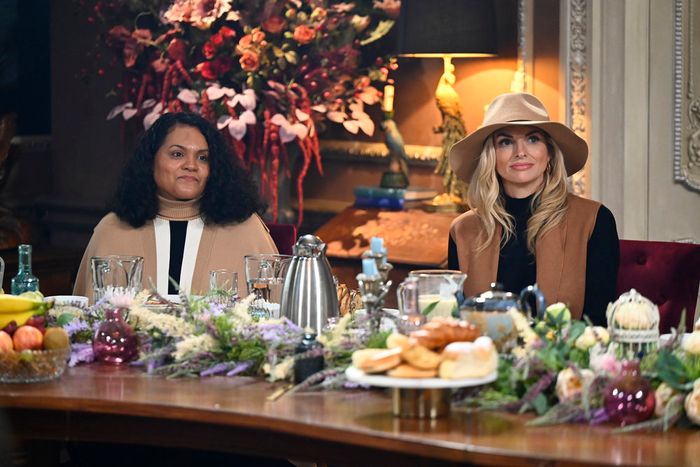
Spoilers ahead for the entirety of season two of The Traitors.
Halfway through the season-two finale of The Traitors, I was feeling heartbroken. I’d come into this season rooting for the Survivor and Big Brother players, then watched each of them get banished, but I’d held out hope for Sandra Diaz-Twine. As Sandra’s game came to an end, I sat there with my friend in deflated silence, quietly resenting everyone who had banished our queen. I couldn’t imagine coming back around on this finale now.
Something happened, though: The drama didn’t end. I should’ve remembered this is The Traitors, and traitorous behavior has never been limited to the murderers in the turret. As CT Tamburello and eventually Trishelle Cannatella voted to banish MJ Javid and share the money between the two of them, I gasped and swore and laughed in amazement, knowing I was witnessing high drama. Sure, these were two players I didn’t know that well, having never watched The Challenge; I’m not even sure I like Trishelle as a person. And yet I couldn’t stop grinning as CT finally confirmed his Faithful status and she collapsed in relief, her choice to trust an old friend and rival vindicated. I’d just witnessed a betrayal more visceral than any murder all season, but it came with real emotional catharsis and warmth.
The journey I experienced — wanting one outcome so badly, not getting it, and yet finding myself swept away by a different one — is characteristic for The Traitors. It’s natural to go into an all-stars-type season like this one with an attachment to your faves, but enjoying the ride also depends on accepting that any episode could be their last. This is a star-studded cast, with practically every player commanding their own fan base, yet few viewers came in with a thorough understanding of every single cast member and their preexisting relationships. So there’s no agreed-upon ideal endgame for the show; it shifts depending on whom you’re talking to and which TV shows they watch.
Every viewer comes to The Traitors from a different angle: I came largely for Sandra, Parvati Shallow, Dan Gheesling, and Janelle Pierzina (and because I liked the show already, especially the U.K. and Australian versions), but a huge segment of fans showed up primarily for the Housewives. There’s a dazzling array of different reality-TV backgrounds onscreen here, but also within the viewership itself. I know multiple people who’ve never watched any of the contestants’ original shows and yet couldn’t stop watching this one. Effective marketing and excellent casting might be responsible for getting eyes on screens the first week, but that’s not all a series needs to maintain its audience. That’s The Traitors’ most impressive accomplishment, in my book: presenting a satisfying, emotionally involving narrative that’s accessible regardless of your prior investment in the shows being referenced.
This largely comes down to the edit, and it’s a real credit to the economical storytelling that my own allegiances shifted so often over the course of this season. I went in deeply concerned about the prospect of losing Dan and Parvati, but ended up feeling oddly pleased that Phaedra became the last Traitor standing of the original three. That’s partly because Phaedra is TV gold, but it’s also because the edit prepared us for this outcome. We saw all the Traitors’ strengths and weaknesses from the beginning, through a combination of gameplay and expositional confessionals. Dan’s self-preservation-based gameplay and preference for listening over contributing made him formidable in Big Brother, but would likely doom him as a Traitor. Parvati could stand her ground, make big moves, and act her ass off, but also sometimes drew too much attention to herself. Phaedra was brilliant, lovable, and under the radar to the point of near-invisibility, but also ultimately unconcerned with strategizing. As early as episode two, you could guess pretty easily that Dan would be the least successful Traitor, followed by Parvati, with Phaedra left. As in many of the best reality TV seasons, there’s a general sense that the show is subtly guiding us toward a conclusion that feels right, telling a story on its own terms.
That’s not to say there isn’t payoff for those who have been watching these people onscreen for years; I’ve always been compelled by the question of who deserves the title “queen of Survivor,” so it was deeply gratifying to see Parvati and Sandra squash their relatively recent beef and protect each other for a while. But I also managed to get swept up in the drama between CT and Trishelle at the torch lighting, long before I knew the role it would play in the finale. Same goes for Phaedra’s surprisingly tearful reaction to Shereé Whitfield lighting her torch, an organic, sincere expression of her gratitude for their friendship that almost made me cry, even though I knew very little about Shereé before that moment. By establishing and developing these decades-old pairings in short but potent bursts, the show manages to contain a remarkable amount of basic backstory.
These little reunions are a treat, functioning as de facto sequels and offering the perfect amount of context to root us in these characters without getting too bogged down in decades of reality-TV history. But this strategy of moments-based storytelling is also helpful in constructing delightfully fanfic-y new relationship stories — like the would-be star-crossed showmance of Phaedra and CT, established in just a few blips and interactions that have already been immortalized in fan cams: their holding hands as they hike through the woods, for example, or Phaedra lighting CT’s torch. It doesn’t matter that both of them have denied any actual romantic connection — in this grandiose, operatic environment, their dynamic works as a kind of tragic love story. Looking at CT’s winner edit in retrospect, his doomed relationship with Phaedra works as a narrative counterbalance to his old, trusty bond with Trishelle. Both connections are real, but to win, CT needed to sacrifice one and prioritize the other above anything else.
With those stakes in place, Phaedra’s final episode manages to overcome the high potential for anticlimax. It steers into the inevitability of her banishment, lingering in the palpable emotions of the moment instead of relying on trickery to suggest some far-fetched red herring. When the moment arrives, CT can’t deny the truth any longer about who’s been protecting him in this game, and Phaedra isn’t asked to pretend anymore, with either him or her old friend Shereé. She’s free, and it’s a sad, beautiful conclusion to her arc.
Of course, it’s always necessary to leave material on the cutting-room floor. As is often the case, various contestants have chimed in on podcasts and social media to point out some of these missing details: Janelle has repeatedly made a point of insisting she knew Dan and Parvati were Traitors from day two, and that she called out Parvati during the same final roundtable when she called out Sandra and CT. Similarly, Peter Weber told me he called out Phaedra as a Traitor at the roundtable when Dan left — a point that the episode only really credited to Trishelle (perhaps an early sign of a winner edit, although the show never shied away from showing Trishelle at her most grating).
In both these cases, though, the missing details aren’t crucial to the overall narrative, and if anything, their inclusion would risk muddling the story. Based on exit interviews like Janelle’s, it’s possible the editors deliberately chose to hide how much suspicion Parvati was drawing in the castle, so as not to spoil her dead-woman-walking status in her final weeks. But even if that’s true, that editorial choice clearly accomplished what it was meant to: provide us with enough hope during that middle stretch of the season to believe she had a chance of pulling out of her tailspin and defeating Peter. In retrospect, her banishment feels like a foregone conclusion, but we needed that ambiguity as viewers.
As in scripted TV, some things aren’t meant to be explained in full. Take the delightful scene of Sandra at the pool table, illustrating the importance of banishing one of the Peter Pals. Sandra later took to Instagram to further clarify her thinking here: She knew it was likely there were Traitors in her group (“the leftovers”), but also understood that this game is about getting to the end at all costs — even if that means intentionally banishing Faithfuls and working with people you suspect as Traitors. It’s a nice bit of insight, but the episode already implies it and still includes the most important character detail: These are the same skills that Sandra put to use on Survivor. We don’t need to explicitly hear that Sandra plans to keep Parvati around longer to ensure her own safety, especially because it’s the same essential idea as what Peter tries with Parv an episode later — or what Janelle attempted early on with Dan. In all three of these cases, the “keeping Traitors around to get to the end” strategies aren’t explained in depth by the players onscreen, but the show would risk repeating itself if they were.
Still, it’s true that The Traitors is an imperfect game, and that extends to the edit. The missions have improved, but they often take up too much time relative to their impact on the overall game. There are also some goofy structural choices, like deviating from the standard rhythm of murder and banishment for a cheesy mid-roundtable cliffhanger. But The Traitors is intentionally heightened and campy, and the ridiculous twists, music cues, and reaction shots are all part of it, in service of a gloriously over-the-top production that cackles at itself while also playing the whole thing straight.
The goal in editing together a series like this one isn’t complete truthfulness, and it’s certainly not exhaustiveness. It’s about piecing together a mass of raw footage in a way that makes sense, maintaining a consistent range of tones — delivering comedy, drama, intensity, and also light, soapy fun. It’s about juggling a cast of TV icons and letting them slip into new or old roles, from the award-worthy masterminds to the quirky himbo sidekicks, distilling their rich histories down and giving each of them their time to shine. It may be “reality” we’re watching, but there still needs to be a compelling story, and The Traitors constructed one as sturdy and accommodating as Alan Cumming’s castle.
More From This Series
- The Traitors Has a Glaring Flaw When It Comes to the Actual Game
- Dylan Efron Is Still Cool With Being Known As Zac’s Brother
- In Memoriam: The Traitors Season 3(’s Hats)


